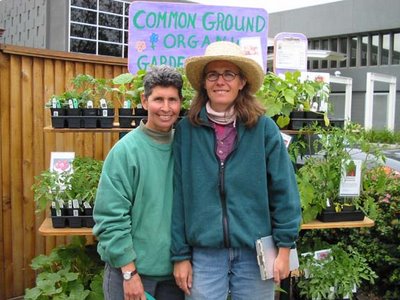 PALO ALTO, CALIFORNIA - Whether it's gardening classes, tools or supplies, Common Ground Organic Garden Supply and Education Center in Palo Alto has filled the bill for gardeners and mini-farmers for 34 years.
PALO ALTO, CALIFORNIA - Whether it's gardening classes, tools or supplies, Common Ground Organic Garden Supply and Education Center in Palo Alto has filled the bill for gardeners and mini-farmers for 34 years.John Jeavons is executive director and a founder of Ecology Action of the Midpeninsula, a nonprofit environmental research and education organization that started in Palo Alto and later moved to Willits (Mendocino County).
Common Ground is one of Ecology Action's projects.
Ecology Action began in 1970 when a group of Palo Alto residents got together to start a recycling program in the city, said Patricia Becker, manager of the Common Ground center.
After the city took over the recycling program, Becker said, Ecology Action started four more projects: a bicycle workshop that also promoted bicycle lanes in Palo Alto, the Common Ground education center, the Common Ground supply center and the half-acre Common Ground research, demonstration and biointensive garden at Syntex Corp. in Palo Alto.
The bicycle workshop evolved into the independent Wheelsmith bicycle repair shop and then into Wheelsmith Fabrications Inc., a maker of lightweight bicycle wheels that moved to Big Timber, Mont.
The garden was discontinued in 1981, a year before Ecology Action moved to Willits, where it has demonstration gardens and promotes biointensive mini-farming throughout the world.
Using organic and sustainable techniques developed by the late English horticulturist Alan Chadwick, biointensive practices emphasize ways to grow enough food for a family of four on much less land than required by conventional agriculture.
Those techniques stress seven factors used in combination:
-- Double-dug raised beds.
-- Composting.
-- Intensive planting.
-- Companion planting -- plants that do well together or that attract or repel insects.
-- Carbon farming -- feed and grain crops such as corn, wheat, millet, amaranth and oats that produce a large number of calories and make good compost.
-- Calorie farming -- high-calorie crops such as potatoes, sweet potatoes and parsnips.
-- Open-pollinated seeds rather than hybrids.
Jeavons describes these techniques in his "How to Grow More Vegetables (and Fruits, Nuts, Berries, Grains and Other Crops) Than You Ever Thought Possible on Less Land Than You Can Imagine." Originally written in 1974, the book will come out in a seventh edition from Ten Speed Press this month.
Becker worked as Common Ground's class coordinator for four years. At that time, the center was at 225 El Camino Real. She became the center's manager in 2000 and supervised its move to 559 College Ave. in September 2001.
Originally from Pittsburgh, Becker became seriously interested in macrobiotics in her late 20s. Macrobiotics is a dietary approach that stresses whole grains, fresh vegetables, beans and other "seasonal, local and organic" foods, she said.
She came to California in 1984 to work as a macrobiotic chef in a Hillsborough couple's home. Since then, her career has taken her to such places as Harbin Hot Springs in Lake County and Hidden Villa Organic Farm and Wilderness Preserve in Los Altos Hills.
She describes Common Ground as follows: "It's community; it's gardening; it's education."
"We want to have what people need" for gardening. She also wants it to carry locally made items such as jams, honey, soaps and crafts.
In addition, the center sells high-quality garden tools. It has a lending library for members (basic membership costs $25 a year) and a reference library for in-store reading.
Customers can buy more than 500 varieties of seeds in jars or packets, vegetable and herb seedlings, native plants, organic fertilizers and soil conditioners, and natural pest control products.
Common Ground also offers classes ranging from an introduction to permaculture to composting techniques and designing sustainable landscapes. A complete schedule is at commongroundinpaloalto.org.
Harking back to its roots, the center plans to develop a garden on land offered by the Palo Alto Christian Reformed Church on Arastradero Road, which will be used to demonstrate intensive gardening methods and to raise seedlings to sell at the center. It also will be an outdoor classroom.
Becker expects planting to start by the end of the year. The center is still looking for a sponsor to provide funds to hire a full- or three-quarter-time gardener, she said.
from The San Francisco Chronicle
No comments:
Post a Comment